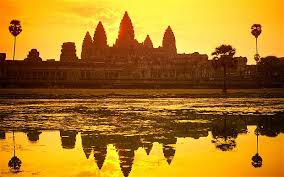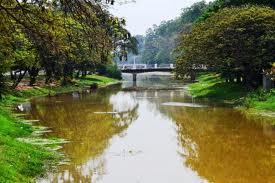I’m back! I’ll be writing about my Vipassana meditation experience, which took me away from reading and writing and phones and friends and music and talking for ten days, but I’m still processing. That was in Thailand. We now continue our Chinese Spring Festival migrations just to the east, in another of the countries that our nearly five-year residence in the Middle Kingdom has made affordable and reachable. I got lost, twice in twelve hours. Story of my life, but a pretty fortunate tale and an extravagantly lucky existence it’s been, and remains. And how are all of you doing today?
So much has been lost in this country, which is the embattled remainder of a once-mighty medieval Khmer empire. I came here knowing little of that, other than something of the dreadfully crazed policies of the Khmer Rouge political movement, its maniacally destructive leader Pol Pot, and the fierce heat of words like “killing fields”: millions of dead in a country with less than half the population of Canada. We came for the more

An astounding pile of rock. How’d they do it? Stay tuned to this radio station for some of the details!
substantial fruit of an earlier monomania: the astounding Angkor Wat temple complex, the most outstandingly ambitious of the hundreds of tributes to gods and kings and god-kings in the area near the city of Siem Reap. We got lost in merely inconvenient, petty or even amusing ways. Again and still, the moral of the story is right up front: people of my time and place are such privileged people. We can tell stories, like these, where the worst peril is blisters, unmerited indignation, or the story falling flat in my telling. Danger! So, let’s see:
The Siem Reap airport, quite new and charmingly small, welcomes planes mainly from Bangkok, like ours, filled with predominantly young tourists heading for Angkor Wat and the many small pleasure temples that have transformed this city of half a million. Seven dollars got us a pleasant short car ride to the Jasmine Lodge, where we dragged our luggage and our weary frames over the construction bricks and ditches into the open-air lobby at a little after 10 p.m. Nice, except for one modest and unanticipated adrenaline rush: the place was ready for us for nights 2-4, but not for that first one. It did no good to show the email confirmation sent from their own website a month before; they were full, only able to offer us dormitory-style accommodation nearby. This middle-aged couple and their teenaged son, “sleeping” en famille with the young pub-crawlers of southeast Asian hedonism? Um, no thanks.
After some useless questions and mild arm-waving and finger-pointing, we gave up and split our duties: our travel agent (my wife) and high-tech consultant (my son) sat down with the comm-tech/entertainment/work station (my laptop) to search for a room – this at the end of the Chinese New Year rush – and our Dark Ops Team (me) went wandering through nearby streets dotted with guest houses. The Victory was just around the corner (full), then came Mother Home (full) and a few others I can’t remember (full, or with no visible signs of staffing life). Adventure Time! Indiana James! That was lots better than dragging a mournful grimace of jilted privilege through the narrow alleys of a sweaty night. A kind young woman who just wanted to finish her long desk-clerk day walked me around an unseen corner to find the Okay Guesthouse, which was more than so-so and had one suite left – for 87 bucks, six times what we’ve paid at the Jasmine. “Please hold it for ten minutes, okay? Ten minutes – I’ll come back after I check with my wife!”
I kept going the same direction, which in my usual inversion of geographical logic was the wrong way. However, it did send me by the Yellow guest house, which also had one room left, with air conditioning, at 15 dollars. “Please hold this room! Ten minutes, okay?” And off I ran, ultimately in several directions, and when I got back near the Victory, I thought I was oriented pretty well. That’s why I kept returning to the same little dead-end, three times in all, not quite believing that there wasn’t a way through. Then I heard the voice of an angel: my geographically better half, having found an expensive place on-line, was out searching for her surely-disoriented husband. Whew! Rescued at the brink of doom, and so on, and not far from the Jasmine at all, we were soon settled in the Yellow. Crisis averted. Lost and found. A warm shower. Beds.
Having just emerged from a ten-day meditation retreat, where short walks were the only exercise possible, I was eager to get out and run the streets of Siem Reap the next morning. By 8:45, as my co-travellers slept, I was out on the already-sweltering streets of an utterly unfamiliar city. GeoBride always worries about these jaunts, because of my gift for, and occasional enjoyment of, lostness. There is no better way to see a new city, though, and I keep it simple: I do straight-line, out-and-back routes, and I actually pay attention when I’m by myself. I did well. I did great. I forgot only one little turn…
I got to the main drag, and ran past the Jasmine. Check. Time noted, and a straight line for 8 minutes, with views of a Buddhist temple, some really expensive hotels, and the vaguely pleasant flow of southeast Asian traffic, dominated by motorbikes and tuk-tuks (tourist ferries comprised of a motorcycle and a small canopied cart) that flow around pedestrians and each other with ease and calm. Then came the Siem Reap river. Rule: always run the river. Left I went. (I usually go left, as basketball opponents and Fox News-loving acquaintances have long known.) I loved it. I ran backwards for a few paces so I’d recognize my road on the way back. I counted the bridges. I ran away from tourism, Chinese and European faces, and Khmer restaurants until I was running through stream-side villages of evident poverty and bemused but friendly faces. It didn’t take long; after 25 minutes out, I turned around.
I’d lost count of the bridges, but I wasn’t too worried. Le Grand Hotel d’Angkor was a white elephant not easy to miss, and I didn’t. It was getting really hot, and I’d run a little farther than was absolutely sane, but I was happy. I knew where I was. I ran past the Jasmine looking out for the confluence of Angkor Beer and Coca-Cola signs that I’d noted as my primary left-turn marker. I’d checked my watch, too, and when I got to nine minutes on the main drag, I knew I’d gone too far, not to mention that 50 minutes is ten more than I usually do on my good days.
Walking back, it took only a few minutes to figure out where my turn off National Road No. 6 should’ve been, and remember that the dilapidated white hotel made a better landmark than beverage signs. I turned right, and our Yellow Guesthouse was on the right, I knew, and so I walked along, noting laundry services and Internet cafes that we could use, along with many more dress shops and two more dentist’s offices than I remembered. Uh-oh. Back I turned. Yup, I’d definitely begun running toward that formerly grand old hotel, so that had to be correct. (BUT: I couldn’t help remembering a similar run in Macau, arriving back at my friends’ building complex with total, unshakable-by-mere-facts confidence that they lived in Tower Two, and consequently spending an hour walking up and down stairs looking for their apartment door; only a desperate decision to start shouting up from the street to their apartment, which I’d been pretty sure was between the 12th and 15th floors, eventually yielded an answering cry from Tower One. Oops. My mobile didn’t have the right SIM card there, either.)
So I doubled back. I asked several shopkeepers, and finally two guys in an Internet café knew the place. Yeah, keep going back that way (okay, I’m not so dumb!) and then turn right. (What? There’s another turn?) Sure enough, I’d forgotten a right turn 30 metres from the Yellow’s front door. This was a hot, hungry morning, but that was soon solved. My thighs groaned for the 36 hours following, especially climbing the many stairs of Angkor Wat and other ancient temples. That’s it, that’s the damage, but it added to the immediate-family lore of my pale adventures. (Let’s hope Son the Fourth gets his mother’s sense of direction.)
It was a gentle kind of lostness. True loss is for him whose days have been spent in utter ignorance of his own self, the Man said, and God knows I’ve had my share of that, too. I wonder (and wonder) how a country like Cambodia recovers from its grievous, unimaginable losses, but it does, it does, it does. Those ruined palaces and pagodas, and the infusion of well-heeled and mostly oblivious foreigners they draw, are part of the healing, no doubt. Compared to the horrors I’m learning more about, my anxieties and defeats — let alone my disoriented tourism — are tiny little potatoes, and fairly edible ones.

